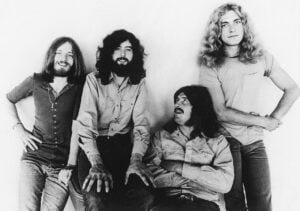Top 5 Rockers Who Should Never Have Been Fired

It's Only Rock And Roll PODCAST / YouTube
The world of rock and roll has witnessed numerous ups and downs, and among them are decisions that have changed the direction of famed bands forever. Firing a band member can either lead to a fresh start or spark a debate about what could have been if they had stayed. Here are five rockers whose dismissals from their bands remain hotly contested moves.
Dennis DeYoung (Styx)
View this post on Instagram
Dennis DeYoung, a founding member of Styx, was known for his distinct voice that helmed hits like “Lady” and “Come Sail Away.” His vision carried the band into grandiose territories, with rock operas and ballads that became synonymous with Styx’s identity. However, tension arose over musical direction; DeYoung’s preference for theatrical rock clashed with the rest of the band’s lean towards rock with a straight edge. In 1999, the friction reached a fever pitch, resulting in his exit. Without DeYoung, Styx continued but couldn’t replicate the unique blend of rock theatre that defined their golden years.
DeYoung’s departure was about more than just a change in personnel—it marked a shift away from the dramatic flair that had brought the band its greatest success. The impacts of his firing were felt deeply by fans, many of whom to this day believe that Styx lost a key part of its soul without him. DeYoung’s legacy with the band is a reminder of the fragile nature of musical synergy and the consequences of severing it.
Peter Criss (Kiss)
View this post on Instagram
The man behind the cat persona, drummer Peter Criss, was part of the original lineup of Kiss, a band known as much for their makeup and theatrics as their music. Criss’s raspy voice gave us the hit ballad “Beth,” which showcased a softer side of the otherwise harsh and loud band. However, internal disagreements and Criss’s dissatisfaction with the band’s direction led to his departure in 1980. This was a turning point for Kiss, who struggled to maintain the iconic cohesion that had brought them fame.
Criss’s exit marked the beginning of a rotating lineup of musicians that would don and shed the cat makeup in years following. Fans often argue that firing Criss was a mistake, robbing the band of the original chemistry that made them superstars. Criss himself would periodically return to the band, but the magic of the original quartet was hard to recapture, underscoring the integral role he played in their success.
Dave Mustaine (Metallica)
View this post on Instagram
Before Metallica became thrash metal titans, they cut ties with guitarist Dave Mustaine in 1983, a decision fueled by his substance abuse and clashes with fellow band members. Despite his issues, Mustaine was a driving force in Metallica’s early sound, contributing to their aggressive thrash metal edge. His unceremonious firing would lead him to form Megadeth, another major player in the thrash metal scene, proving his departure wasn’t an end to his musical influence.
Metallica soared to greater heights, but some argue that the raw sound and fury that Mustaine brought to the table were integral to the band’s initial success. His dismissal is a source of speculation to this day: what direction would Metallica have taken if Mustaine had stayed? His fingerprints remain on their early work, but his potential contributions to Metallica’s later evolution remain an intriguing unknown.
Lindsey Buckingham (Fleetwood Mac)
View this post on Instagram
Lindsey Buckingham’s masterful guitar work and innovative production helped Fleetwood Mac achieve monumental success, particularly on their legendary album “Rumours.” However, Buckingham’s strong vision often led to friction with his bandmates. Despite a successful career with the band, he was fired in 2018, a decision that surprised many, given his long tenure and the central role he played in shaping the band’s sound.
Without Buckingham, Fleetwood Mac lost a key piece of their puzzle, a musical genius who pushed the band toward their iconic status. While replacements can fill a vacancy, they can’t always capture the unique spark of the original member. Buckingham’s exit from the band highlights the delicate balance between creative differences and the pursuit of a common artistic goal—a balance that, once disrupted, can change the course of a band’s history.
Ozzy Osbourne (Black Sabbath)
View this post on Instagram
Ozzy Osbourne’s wild antics and unmistakable voice made him a legend as the frontman of Black Sabbath. Known as the “Prince of Darkness,” his presence was integral to the band’s dark and heavy sound. However, his substance abuse led to his firing in 1979, leaving fans bewildered. Black Sabbath continued, exploring new directions, while Osbourne launched a successful solo career, yet many wondered what could have been had the band remained intact.
Osbourne’s departure from Black Sabbath was not just the loss of a member, but the loss of a persona that was synonymous with the band’s identity. While both he and the band found success separately, to this day fans debate whether firing him was the right move. There’s no denying that with Osbourne, Black Sabbath defined a genre, and his dismissal remains one of rock’s most controversial moments.













